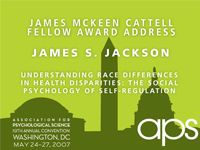How Culture Affects the Way We Think

“Culture is like water for fish,” APS Fellow and Charter Member Shinobu Kitayama, University of Michigan, explained during the special Culture and Cognition themed program at the APS 19th Annual Convention. But defining our own culture is difficult, “because it is the only thing we know,” Kitayama said in his talk, “Voluntary Settlement and the Spirit of Independence: Some More Evidence from Japan’s ‘Northern Frontier.'”
Speaking to a packed room, Kitayama noted that researchers investigating cultural differences often contrast Western and Eastern cultures. Kitayama, however, utilized two separate samples from Japan — one from the mainland and the other from the island of Hokkaido — to examine differences in individualism that may exist in Japanese culture.
Hokkaido, Japan’s northernmost territory, is unique due to its history as a frontier in Japan. For several reasons, including the collapse of the feudal government in Japan, which resulted in fewer job for Japan’s samurai soldiers, and a need to protect Hokkaido from increasing Russian aggression, many samurai were initially deployed to the island in the mid-1800’s. Subsequently, a large number of farmers and peasants followed suit in search of land, wealth, and freedom. According to the voluntary settlement hypothesis, the immigration to the frontier, while economically motivated, may have fostered psychological orientations toward independence.
Kitayama examined this notion by assessing Hokkaido-born and non-Hokkaido-born college students’ implicit theory of independence, and found that, like Americans, Hokkaido Japanese show a strong cognitive bias called the fundamental attribution error. They tend to explain another person’s behavior in terms of internal traits while ignoring situational forces. In contrast, mainland Japanese showed no such bias. The pattern suggests that the voluntary settlement hypothesis may indeed apply to individuals from Hokkaido.
This finding is particularly interesting in the context of the differences between Japanese and American values, beliefs, and traditions. As APS Fellow Richard Nisbett, University of Michigan, pointed out, modern Asian cultures are relatively collectivist or interdependent, whereas Western cultures thrive on independence and individualism, and it follows that these societal values sculpt one’s point of view.
Nisbett cited a study in which researchers used an eye-tracking device to pinpoint exactly where participants look when given a photo with a salient object (e.g., a train) set against a busy background. Americans looked outside the object an average of one time but had eight or nine fixations on the actual object. On the other hand, Chinese participants had one sharp initial fixation on the object followed by five or six fixations on the background context. “If people are seeing different things, it may be because they are looking differently at the world,” Nisbett added.
Doug Medin, Northwestern University, agreed. During his talk, Medin, who is on the APS Board, presented research on the effect of our “cultural framework” (i.e., how we make sense of the world) on inter-group conflict. He said that the way we organize our knowledge varies by culture, and that this knowledge plays a large role in the ways we view others. Thus, limited observation of other groups and immersion solely in our own culture leads to overgeneralization of other cultures and the perpetuation of stereotypes.
East is East and West is West, And Never the Brain Shall Meet
 Denise Park, a past APS Board Member, theorizes that different cultural experiences shape the neural structure of our brains. At the University of Illinois, Urbana-Champaign, Park and her colleagues used fMRI technology to identify which areas of the brain differ across cultures. Park has found that Westerners are more likely than East Asians to show activation in perceptual areas specialized for object recognition.
Denise Park, a past APS Board Member, theorizes that different cultural experiences shape the neural structure of our brains. At the University of Illinois, Urbana-Champaign, Park and her colleagues used fMRI technology to identify which areas of the brain differ across cultures. Park has found that Westerners are more likely than East Asians to show activation in perceptual areas specialized for object recognition.
She also has investigated neural differences in the aging population to see how prolonged exposure to a culture influences the way we think and process information. To study these perceptual effects on the brain, Park showed young and old participants from Singapore and the United States a picture several times until the activation in their brains had habituated to the scene. She then showed them a novel photo with the same object but a new background followed by one with the same background but a new object. The elderly Singaporeans showed virtually no activation in the object area of the brain, whereas the activity in the background area of the brain was far more robust than that seen in the Americans.
This decreased object processing with age seen in the Singaporeans may be a result of not exercising the object area of the brain on a daily basis due to the cultural proclivity not to do so. Interestingly, when they were instructed to focus solely on the object, the object processing area was activated and functioned well, demonstrating the plasticity of our brain.
Remember When…
If a person concentrates more on the social context of a scene, rather than the personal roles and perspectives within the scene, will it alter their memory of the scene? “Yes,” says Qi Wang, Cornell University. Wang posits that cultural differences are found across autobiographical memory, our memories of important events in our own life.
Wang’s research shows that culture affects the amount of detail one recalls, the reference to individuals themselves or other people and social context, and the ability to retrieve the memory after an elapsed time period. Wang said that “the remembering of the self is a cultural process that gives rise to both commonality and diversity in human memory and cognition.”
Wang also has found that American children as young as three can recall more personal detail on life events and talk more frequently about their characteristics than Asian children but recall less about relationships and group activities. This is a result of the focus on autonomy and individual uniqueness in Western cultures.
Another study shows the importance of family narrative environment on personal remembering. Mothers were observed sharing memories with their young children. American mothers used a highly elaborative, interactive style, whereas Asian mothers had a more pragmatic style, constantly questioning the children on the details of the story. The use of the elaborative style by the American mothers helped children remember the events up to a year and half after the study.
Wang’s findings illustrate that constructs of the self differ across cultures as a function of the social orientations, cultural values, and narrative environments in which children are raised.
The participants of the Culture and Cognition program conveyed the view that this budding field of research has implications for medicine, law, and science by allowing professionals to tailor their practices toward specific cultures. Likewise, new directions in culture and cognition research may elucidate why some cultures seem to value human rights and religious freedom more than others. By advancing the understanding of the differences and commonalities of cross-cultural mindsets, researchers have taken a step forward in preserving relationships across borders and celebrating, not condemning, cultures different from our own.




Comments
Would have been great if any references were provided. Any chance to know which studies by Wang please?
Thanks
APS regularly opens certain online articles for discussion on our website. Effective February 2021, you must be a logged-in APS member to post comments. By posting a comment, you agree to our Community Guidelines and the display of your profile information, including your name and affiliation. Any opinions, findings, conclusions, or recommendations present in article comments are those of the writers and do not necessarily reflect the views of APS or the article’s author. For more information, please see our Community Guidelines.
Please login with your APS account to comment.